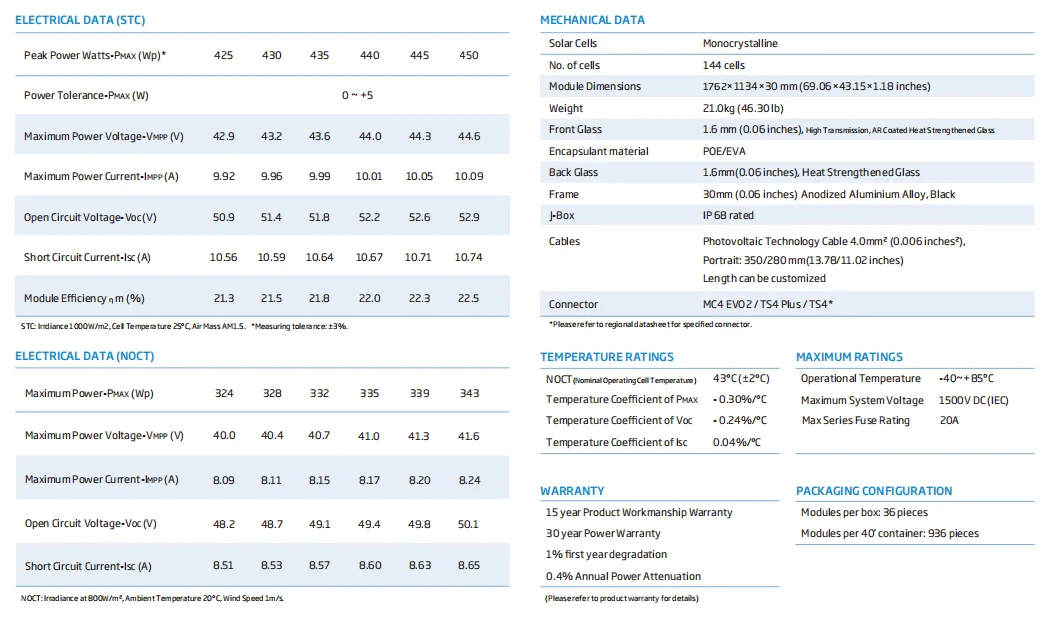Choosing the Right 24V Solar Panel for Your Energy Needs
Exploring 24V Solar Panels A Perfect Solution for Renewable Energy
As the world continues to seek sustainable and environmentally friendly energy solutions, solar power has emerged as a leading contender. Among the various types of solar panels available, 24V solar panels are gaining popularity for both residential and commercial applications. This article delves into the features, benefits, and applications of 24V solar panels, providing an insightful overview for potential users.
What Are 24V Solar Panels?
24V solar panels are a type of photovoltaic (PV) panel designed to generate electrical power with a nominal output of 24 volts. These panels can be used individually or in series to create larger solar energy systems. The output voltage is achieved through a combination of solar cells, typically made of silicon, that convert sunlight into electricity. The 24V system voltage makes these panels ideal for various applications, ranging from small residential systems to large-scale solar farms.
Benefits of 24V Solar Panels
1. Higher Efficiency One of the primary advantages of 24V solar panels is their efficiency. They can generate more power than their lower-voltage counterparts, which makes them suitable for applications where space is limited. This means that homeowners and businesses can meet their energy needs with fewer panels, leading to significant savings on installation costs.
2. Reduced Wiring Costs 24V solar panels allow for longer distances to be covered with minimal power loss. This can lead to reduced wiring costs and simpler installation, especially in larger systems where panels are placed far from the battery bank or inverter.
3. Compatibility with Batteries The 24V output is commonly accepted by various battery bank systems, which makes these panels an excellent choice for off-grid setups. Users can easily integrate 24V solar panels with 24V batteries, allowing them to store energy for use during cloudy days or at night.
4. Enhanced Performance 24V systems are generally more versatile when connecting multiple panels. This flexibility makes it easier to expand the solar array in the future if the energy needs increase. The ability to expand the system while maintaining a consistent voltage output streamlines the process.
5. Environmental Benefits By utilizing 24V solar panels as a renewable energy source, users can significantly reduce their carbon footprint. Harnessing solar energy helps decrease reliance on fossil fuels, leading to a cleaner and more sustainable environment.
24v solar panel

Applications of 24V Solar Panels
The versatility of 24V solar panels means they can be utilized across various applications. Here are some of the most common uses
1. Residential Systems Homeowners can install 24V solar panels for rooftop solar applications. Whether powering appliances or charging batteries, these panels can significantly reduce electricity bills and provide a reliable source of energy.
2. Agricultural Use Farmers often turn to 24V solar panels to power irrigation systems, water pumps, and greenhouse ventilation systems. This off-grid solution helps save on electricity costs while irrigating crops more sustainably.
3. Remote Areas For properties in remote areas without access to the traditional power grid, 24V solar panels provide an effective solution. They can power lighting, communication tools, and other essential devices, enhancing the quality of life while promoting sustainable living.
4. Recreational Vehicles (RVs) and Boats The portability and efficiency of 24V solar panels make them perfect for RVs and marine applications. They can provide power for lighting, appliances, and charging devices, ensuring a comfortable and convenient experience while on the go.
5. Backup Power Systems In areas prone to power outages, 24V solar panels can be integrated into backup power systems. Users can store energy in batteries and rely on solar power during outages, ensuring that critical systems remain operational.
Conclusion
24V solar panels represent a practical and efficient choice for those looking to embrace renewable energy. Their high-efficiency output, compatibility with battery systems, and versatility across a range of applications make them an ideal solution for residential, commercial, and off-grid energy needs. As technology continues to advance, the adoption of solar energy will likely grow, and 24V solar panels will play a crucial role in this transition towards a sustainable future. By harnessing the power of the sun, we can move closer to energy independence while protecting our planet for future generations.
-
Unlocking Energy Freedom with the Off Grid Solar InverterNewsJun.06,2025
-
Unlock More Solar Power with a High-Efficiency Bifacial Solar PanelNewsJun.06,2025
-
Power Your Future with High-Efficiency Monocrystalline Solar PanelsNewsJun.06,2025
-
Next-Gen Solar Power Starts with Micro Solar InvertersNewsJun.06,2025
-
Harnessing Peak Efficiency with the On Grid Solar InverterNewsJun.06,2025
-
Discover Unmatched Efficiency with the Latest String Solar InverterNewsJun.06,2025







